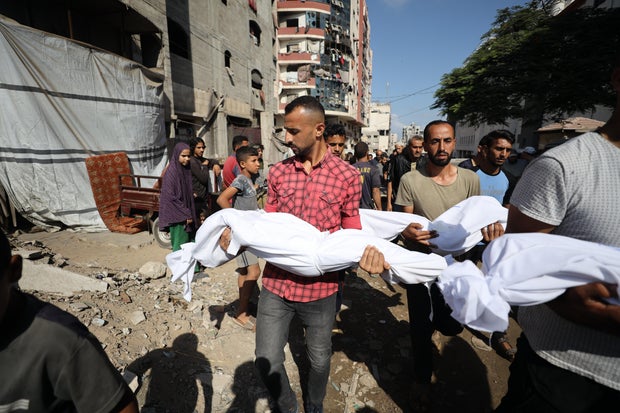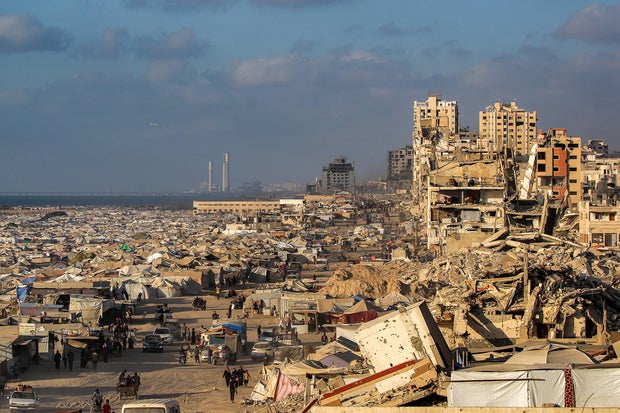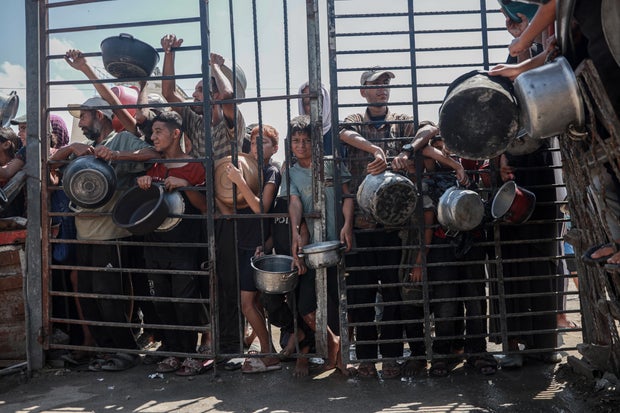Almost 300 reportedly killed in Gaza in 3 days since global experts accused Israel of genocide
Israel’s expanding military offensive has killed at least 287 people in Gaza in the three days since a group of world-leading genocide scholars declared that Israel is committing genocide in the besieged Palestinian enclave, according to health officials in the Hamas-run territory.
The International Association of Genocide Scholars — which includes Holocaust experts — declared in an Aug. 31 resolution that Israel’s actions in Gaza since the 22-month war began constitute genocide, war crimes and crimes against humanity.
As evidence, the group pointed to the killing or maiming of 50,000 children; Israeli leaders characterizing Palestinians in Gaza as “human animals” and threatening to “flatten” the territory and turn it into hell; and Israeli Prime Minister Benjamin Netanyahu endorsing President Trump’s plan for the U.S. to “take over” the strip and have all of its inhabitants “resettled” elsewhere.
Khames Alrefi/Anadolu/Getty
The territory was home to approximately 2.3 million people before the war, which Israel launched in retaliation for the Oct. 7, 2023, terrorist attack orchestrated by Gaza’s Hamas rulers. Some 1,200 Israelis were killed in that attack, and 251 others were taken as hostages into Gaza. Israel’s leader has said 20 of those captives are still believed to be alive.
Israel’s Foreign Ministry dismissed the latest allegation of genocide, saying it was “entirely based on Hamas’ campaign of lies and the laundering of those lies by others.” Its statement went on to say that it was the Israeli people who were actually subjected to genocide by Hamas with the Oct. 7 terrorist attack.
Numerous leading human rights bodies, including Amnesty International, Human Rights Watch, the Israeli organization B’Tselem and the United Nations Special Rapporteur on the Occupied Palestinian Territories, had all previously concluded that Israel’s military operation in Gaza amounted to genocide. Israel has rejected all of the accusations, saying they are based on a false Hamas narrative.
Since the scholars group declared a genocide on Aug. 31, the Hamas-run Gaza Ministry of Health has reported at least 287 people killed by Israeli operations, bringing the total death toll to at least 63,746, as well as 161,245 wounded, since Oct. 7, 2023.
Israel has not allowed international journalists to enter Gaza and operate freely since the war began, despite repeated requests from CBS News and other organizations, so it is impossible to verify the health ministry’s figures, which do not differentiate between civilian and combatant casualties. The U.N. considers the death toll reported by the ministry the most accurate information available, and Israel, while consistently denying the figures, has not provided its own reports on Palestinians killed during the war.
The U.N. Committee on the Rights of Persons with Disabilities said Wednesday, meanwhile, that at least 21,000 Gazan children had been rendered disabled by Israeli assaults since the war began.
Fear grows along with Israel’s offensive in Gaza City
Israel recently declared Gaza City, the biggest population center in the Palestinian territory, a “dangerous combat zone,” and its forces have pushed forward with a controversial plan to seize the metropolis, which Israel’s leader says is necessary to defeat Hamas.
Parts of the city are already considered “red zones,” where Palestinians have been ordered to evacuate ahead of expected heavy fighting.
EYAD BABA/AFP/Getty
That has left residents on edge, including many who returned after fleeing the city in the initial stages of the war. With Israeli bulldozers razing the ground in occupied neighborhoods and some Israeli politicians openly supporting the mass relocation of Palestinians from Gaza, many of the city’s residents fear that departing now could mean leaving for good.
Moving costs thousands of dollars and finding space in the overcrowded south to pitch a tent feels impossible. But staying behind, many say, could be deadly.
“The Israeli forces, when they mark any area by red color and they request the people to leave, they really will destroy it,” Mohammed Alkurdi, who is sheltering in Gaza City along with hundreds of thousands of other Palestinians, told The Associated Press. “So it’s like you decide whether to live or die. It’s very simple like that.”
Since Israel declared the area a combat zone on Friday, a small fraction — some 14,840 Palestinians of the nearly 1 million that the U.N. estimates are still in Gaza City — had left their homes as of Monday, most to flee to the south, according to the Site Management Cluster, a joint humanitarian body that coordinates assistance for people in displacement sites.
A fraction of them, about 2,200, have moved to new places within Gaza City after being displaced by Israeli attacks.
Alkurdi, a project manager and consultant, told the AP he could hear Israeli forces from the apartment where he’s sheltering as they “erase the area completely.”
Zeitoun was once Gaza City’s largest neighborhood, filled with markets, schools and clinics. Over the last month, large swaths of it and the neighboring area of Sabra have been flattened, according to satellite photos reviewed by the AP from early August and early September. The photos show entire blocks have been pummeled or bulldozed into empty, sandy lots.
“It’s not something partial like before. It’s 100%,” Alkurdi said. “The house, I’m telling my friends, it keeps dancing all the day. It keeps dancing, going right and left like an earthquake.”
Abdalhkem Abu Riash/Anadolu/Getty
Many of the people in the city moved back to the north during a ceasefire in January, hoping to find their homes intact. Alkurdi’s home was completely destroyed, so he’s now living alone in a western area of the city. His children and wife were able to leave Gaza last year. He said he would flee south if his home fell under an evacuation order.
Netanyahu defended the Gaza City offensive before it began, insisting the Israeli military had “no choice but to finish the job and complete the defeat of Hamas.” He has said repeatedly that the objective of the war is to demilitarize the enclave, maintain the Israeli military’s “overriding security control” over it, and put a non-Israeli civilian administration in charge. He also says it is aimed at freeing the remaining hostages, though many of the captives’ families have voiced concern that expanding the offensive into densely packed Gaza City will put them at greater risk.
For Gaza’s residents, the operation is already bringing more violence, and the prospect of more upheaval.
Amal Seyam is the general director of the Women’s Affairs Center in Gaza. Originally from the Tuffah neighborhood in eastern Gaza City, her home was destroyed by bombardment. For nearly four months, she has been sheltering in the Nasr neighborhood in the city’s west, where she stays alongside her colleagues inside the women’s center.
Seyam has been displaced five times since the war began — three times within the city and twice to the south, in Rafah and Khan Younis. Each time, she fled with nothing.
When asked if she would consider leaving Gaza City as Israeli forces advance, Seyam said: “I will only leave when everyone who needs me here leaves. As long as there’s a woman who needs me, I am staying. All of Gaza feels like it’s in the red zone now anyway. The bombing is happening meters from us, not kilometers.”
She paused, her voice breaking into tears.
“Many people have started packing. Many have already left. Do you know what displacement means? It means moving once again, building your life once again, buying new things, blankets, tents, all over again.”








